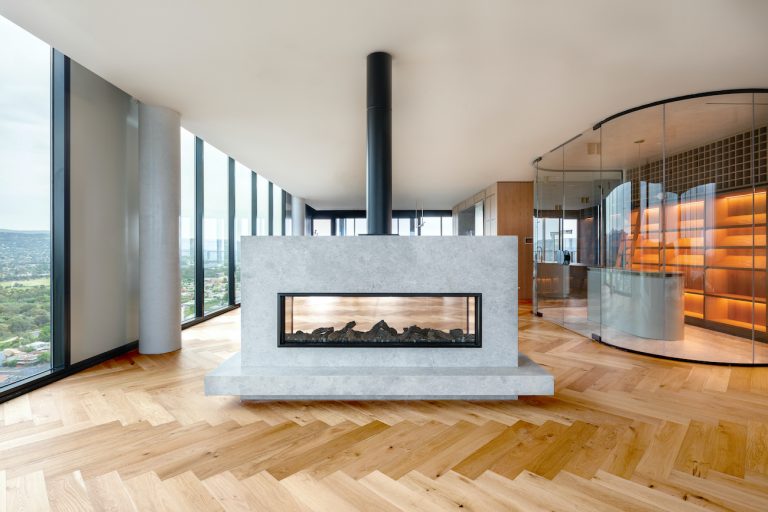What are the benefits of hardwood floors?
Where do we begin?
– Stylish, versatile, timeless
– Durable
– Cost-effective
– Easy to clean and maintain
– Eco-friendly
– Allergy-friendly
For a more in-depth guide to the benefits of hardwood floors, check out our blog.
What’s the difference between solid wood floors and engineered wood floors, and which is right for me?
Solid hardwood floors are milled from a log as a solid piece of wood. Engineered hardwood flooring on the other hand, are manufactured with multiple cross layers of plywood with a thinner real wood top layer. Deciding what’s best for you depends on where you plan to install your floor as that can influence two main factors: moisture and traffic.
Solid hardwood floors are sensitive to moisture, humidity and significant temperature changes, in extreme cases the boards can expand causing cupping or buckling or shrink causing gaps between the boards. For this reason, solid hardwood is not recommended for bathrooms, laundries or basements. With engineered floors, their specific construction counteracts wood’s natural tendency to expand and contract, which means they’re more resistant to fluctuations in temperature and humidity and are resistant to gapping or warping.
Wood floors are susceptible to wear and tear over the course of their lifespan, but that can be rectified with sanding and refinishing. Some engineered floors have thinner veneer wear layers, which means they are unable to be sanded and refinished more than once (if at all) in comparison to solid wood floors which can undertake this process multiple times throughout their lifespan. The good news is, you can opt for an engineered floor with a thicker wear layer.
How do I protect hardwood floors from wear and tear?
Wear and tear is inevitable, but a number of preventative measures can be taken to maximise the appearance and durability of your floors.
– Use doormats or rugs at each entrance to prevent any moisture, dirt or any other damaging substances being brought in.
– Sweep, mop or vacuum regularly. By eliminating any dirt or debris you can avoid any potential scratches occurring.
– Avoid abrasive cleansers, corrosive chemicals and excessive water when cleaning your floor.
– Prevent scratches by using furniture pads where possible.
– Incorporate the use of area rugs in heavy traffic areas – i.e. entrances and hallways, living areas where children will play and pets will lie.
– When exposed to direct sunlight for long periods of time, hardwood floors can experience some discoloration. To avoid uneven discoloration, shuffle furniture and area rugs around regularly.
To learn more, read our blog Protect Your Hardwood Floors From Wear and Tear.
What is the best way to clean my floors?
Hardwood floors can be kept clean using a lightly bristled brush, an electro-static mop or a vacuum (with the beater bar off). Spills should be cleaned up immediately with paper towels, a cloth or a lightly damp mop. When it comes to stubborn stains or sticky residue, never use anything abrasive (steel wool, scourers) and avoid excessive water – so steam cleaners are a no no!
Why should I get my hardwood floors professionally installed, can’t I just do it myself?
While installing your hardwood floors yourself isn’t impossible, it’s no easy feat either. Without the proper tools and know-how, a DIY approach can be disastrous and incur a greater cost than hiring a professional in the first place. After all, hardwood floors are an expensive material – if they get damaged they’re a lot more costly to replace than a can of paint or other materials!
If you decide to install floors yourself, there are several important things to consider:
– Is the subfloor flat and smooth?
– Are you installing hardwood over radiant heating?
– Have you acclimated the wood?
– Do you have the tools to check the moisture?
– Have you checked for defects or damages in the wood?
– Do you know how to centre a room, how much space should be left for expansion gaps and how to work around obstructions?
– Have you ordered extra materials to allow for waste and cuts?
If you’re unsure about any of the above, we recommend consulting a professional. While this will incur additional costs, when you take into account the time it will take you to install the floors, the tools you will need to rent, the extra material you may need to purchase if you run short, it’s much easier and less stressful to leave it to the professionals!
Do I opt for a factory-finished floor or a site-finished floor?
There are 2 main things to consider when deciding on a factory-finished floor or a site-finished floor: style and convenience. With a site-finished floor, you’re able to choose the finish applied which can impact the maintenance of the floor as well as the stain and sheen of the final product.
Because their finish is applied at the factory, factory-finished floors can be walked upon immediately after their installation – whereas site-finished floors require several days to let the finish dry which can hold up the moving in process. The installation of site-finished floors also result in more noise, dust and general disruption to your home. Another added benefit? Factory finished floors can come with more advanced finishes that aren’t achievable on site – including hand-scraping, smoking and deep bevel.
What types of finishes can I get on my floors?
If you decide to install a site-finished floor there are several types of finishes available including polyurethane, water-based UV, oil based, UV oil and gloss. With gloss finishes, there are 3 types including gloss, semi-gloss and matte. Gloss and semi-gloss offer more shine and will reflect more light, whereas a matte finish will offer the least shine and reflection of light.
Are you in the market for a new hardwood floor? The options are aplenty. At Terra Mater we can produce a one-of-a-kind floor to suit all your needs! Contact us today for more information or to speak to one of our team members about custom-designed floors.



